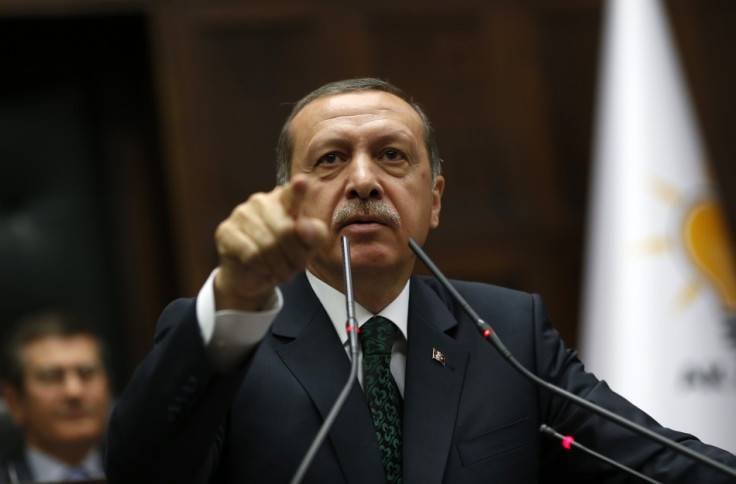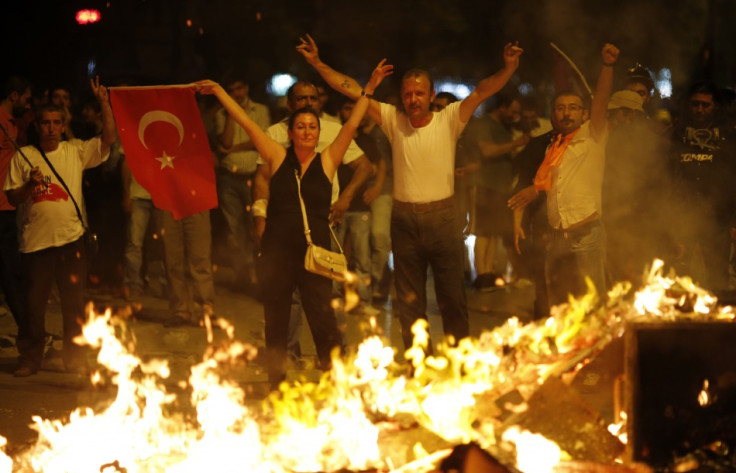Gezi Protests: Erdogan's Treatment of the 'Margins' Damns AKP Oppressors [BLOG]
Recep Tayyip Erdogan calls Turkey's protesters 'marginal' - but, in a true democracy, there aren't any margins

For years the Justice and Development Party (AKP) has cast a pall of oppression over all aspects of Turkish life. Its discourteous, arrogant members have sought to permeate and subjugate all corners of society by interfering in people's lifestyles, passions and beliefs, giving dictatorial instruction on how to think, live and behave towards each other.
This type of social engineering, led by Prime Minister Erdoğan, sees the society as a herd and the government as its shepherds. This mentality has nothing to do with progressive government, pluralistic democracy, freedom of belief, or respecting the lifestyles of others.
When the AKP government told the people "you are either one of us or you do not exist", the people fulminated, erupting in protest and shouting "no, we are not one of you, but we do exist and we are here." From day one of the Gezi protests, the reactions of the AKP authorities, their dictatorial tendencies and the brutal police force used against protesters have sparked debate worldwide.
In a democratic country, the duty of the state and government should be to maintain public order in a way that will protect the rights and liberties of each and every citizen. To this end, the government cannot be prohibitive. If it crosses the line into repression, the nature of the regime becomes very different.
The name of this type of regime is described by Christopher Hitchens: "The totalitarian, to me, is the enemy - the one that's absolute, the one that wants control over the inside of your head, not just your actions and your taxes. And the origins of that are theocratic, obviously. The beginning of that is the idea that there is a supreme leader, or infallible pope, or a chief rabbi, or whatever, who can ventriloquise the divine and tell us what to do."
This is what the AKP authorities, particularly Erdoğan, have been doing ever since they came to power. They took this attitude to an extreme level after the Gezi protests started; with a dreadfully divisive and discriminatory discourse, Prime Minister Erdoğan seems to have chosen his own nation.
In Ankara, he pointed at the crowd he himself had summoned and asked: "If those in Taksim are the nation, who are the people here? Aren't they the nation? We have understood that the true nation is the ones who gathered at those places." (Referring to his rallies in Adana, Mersin, Esenboğa, Pursaklar and Altınpark.)
Erdoğan suggests that his voters and supporters are the true citizens of Turkey whereas the protesters are inclined to be exploited by foreign powers and terrorist organisations; they are not part of the nation. So the people who are not recognised and are even targeted by the prime minister are under the threat of being marginalised.
This menacing and humiliating language used by the AKP government and especially its leader is responsible for the shocking information issued by the Turkish Medical Association (TTB) concerning the medical condition of protesters.
According to the data covered by Medical Chambers and Physicians, from 31 May to 24 June 8038 people were admitted for injuries to public hospitals, private hospitals, medical centers and infirmaries which were temporarily constructed in 13 of the cities where the attacks took place. So far four people have died, while 60 have suffered severe injuries and 103 head traumas. Three people are still in critical condition. (For the full report on demonstrators' injuries, click here).
Despite these shocking statistics, the AKP authorities insist the police response to Gezi has been "proportional", normal and legitimate.
When Dilan Alp, a 17-year-old high school student, was heavily wounded by a police gas canister during this year's May Day celebrations in Istanbul, the city's governor Hüseyin Avni Mutlu announced that she actually deserved what was done to her: "Dilan is a member of an organisation. We have her records. She has been involved in a conflict. She is simply a radical member."

Margins = tyranny
Erdoğan has also called the activists "marginal" and "marauders" on several occasions. But to marginalise people is to rule and dominate. The frequent use of the word "marginal" implies the tyranny of the ruling elite. When they marginalise people, they rule without regarding the voices of minorities and dissident individuals.
Democracy is not confined to majority rule; the concerns of existing minorities are also to be heard. It is a system which accommodates the demands of the margins. In a truly democratic regime, nobody is demonised as marginal. Being a marginal - or more precisely - a free and independent thinker signifies the breadth of one's vision and one's aspiration to liberate oneself from mental slavery. It implies a challenge to established opinions through independent thought.
If the government authorities criminalise, loathe and despise thoughts that they consider "marginal" and are so distrustful of independent ideas, this attitude will only raise doubts about their own intellectual capacity and even demonstrate their bigotry, ignorance, and blind fanaticism.
The AKP government does not have the right to kill, torture or arrest people on accusations that they are "marginal". Everyone has the right to free their minds, and form their own opinions - even if those opinions are against the official ideology of the state.
Uzay Bulut is a freelance journalist based in Ankara.
READ MORE: Turkish Protests Enhance Kurdish Peace Process in Common Demand for Democracy
© Copyright IBTimes 2025. All rights reserved.





















